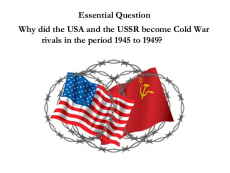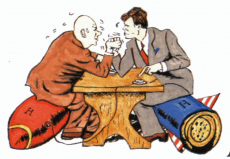
History is not always as it seems, and historians will always debate over to what extent certain issues are true. You may learn about the Cold War in school and how it was an ideological battle of communism v.s capitalism, but is this really true? Perhaps there is more to the scramble for power after World War Two than just ideology. There is a general consensus that the ideological struggle between ‘democratic and free’ capitalist America and ‘equal and just’ communist USSR did shape the war yet the opinions of scholars tend to differ when considering to what extent ideology is of influence. Due somewhat to the length of the Cold War and also the amount of secrecy involved, there are several different schools of thought that have emerged throughout the decades since the early 1950s. Though orthodox, revisionist and post-revisionist theories make up three main categories there are many differentiations and disagreements even within these.
In my opinion I would argue that the Cold War was an ideological struggle to some extent and that ultimately ideology was used by the two opposing superpowers (the US and USSR) as a justification for war. Propaganda was an incredibly powerful tool in promoting ideologies and yet also fear mongering but ultimately global power and prestige were the core aims of both East and West. Post war Europe was devastated militarily and economically and the two rival power blocs of Capitalism and Communism clashed in their efforts to assert their dominance over it.

Considering the relationship between leaders of state is of utmost importance also, with particular reference to Truman replacing Roosevelt and how he conflicted with Stalin. The leaders of the US, UK and USSR all formed an alliance together in the general interest of fighting Nazi Germany and the leaders themselves grew more accustomed to one another. However, when Churchill was replaced and Roosevelt died, the new US president in particular, Harry Truman, antagonized Stalin by boasting that the US had the atomic bomb. The deterioration of relations between leaders can also be said to have contributed therefore at least partially to the Cold War. Therefore, I would argue that the relationship between leaders contributed to the Cold War greatly and also that although Ideology was important it was used largely as an excuse for war between two superpowers.
So you can see that although at first glance ideology seems to explain the Cold War, always consider other options in histroy. What impact can other factors that you may not have considered play on the lead up to war? Think hard and enjoy discussing history, it truly is the best of subjects!
IMAGE 1: http://image.slidesharecdn.com/causesofthecoldwar-130402094828-phpapp02/95/causes-of-the-cold-war-1-638.jpg?cb=1371001296
IMAGE 2: http://www.thelibertybeacon.com/wp-content/uploads/2014/06/cold-war.gif - US President John F. Kennedy in an arm wrestle with USSR leader Nikita Khruschchev.

0 Comment:
Be the first one to comment on this article.